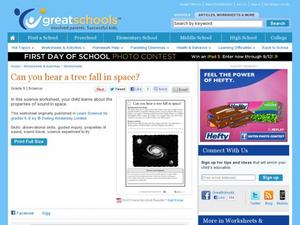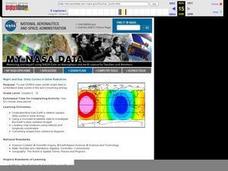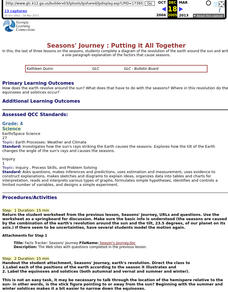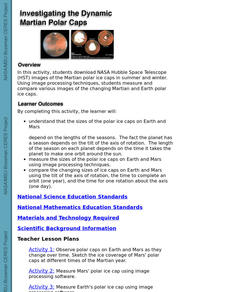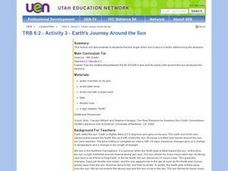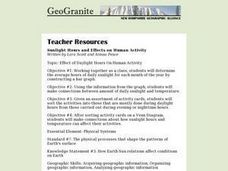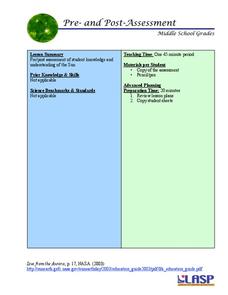Curated OER
Reasons for the Seasons
Students discover how the Earth's axis of rotation affects the angle of sunlight and the length of day. They take a survey and give the survey out to family members and friends. They tally their findings and then determine the correct...
NOAA
The Oceanographic Yo-yo
How does chemistry help deep-sea explorers? Part four of a five-part series of lessons from aboard the Okeanos Explorer introduces middle school scientists to technologies used in ocean exploration. Groups work together to analyze data...
Curated OER
The Reason for the Seasons
Students compare graphs of their data that was generated on a NASA website. In this seasons lesson students complete a lab activity.
Curated OER
Can You Hear a Tree Fall in Space?
How does sound travel in space? Fifth graders investigate this question with a science activity, in which they research the properties of sound. Schedule a lab visit for individual Internet research, or include the activity after you...
Curated OER
NIGHT AND DAY: DAILY CYCLES IN SOLAR RADIATION
Students examine how Earth's rotation causes daily cycles in solar energy using a microset of satellite data to investigate the Earth's daily radiation budget and locating map locations using latitude and longitude coordinates.
Curated OER
SCHOOLYARD SUNDIAL
Students study the apparent motion of the Sun in the sky over the course of a day and a year, and analyze what causes seasons on Earth. They participate in a project that has both a science as well as an art component.
Consortium for Ocean Leadership
Nannofossils Reveal Seafloor Spreading Truth
Spread the word about seafloor spreading! Junior geologists prove Albert Wegener right in an activity that combines data analysis and deep ocean exploration. Learners analyze and graph fossil sample data taken from sites along the...
Curated OER
Shadow Trackers: From Photography to Writing
Students explore the rotation of the earth. In this science instructional activity, students view photos of various places around the world. Students conduct an experiment in which they can see how the earth's rotation creates shadows on...
Curated OER
How Far Away is SOHO?
High schoolers create a scale model of the Earth and the sun that demonstrates where the SOHO satellite is in relation to the Earth.
Curated OER
Seasons' Journey : Putting it All Together
Third graders complete a diagram of the revolution of the earth around the sun and write a one paragraph explanation of the factors that cause seasons.
Curated OER
Investigating the Dynamic Martian Polar Caps
Students download NASA Hubble Space Telescope images of the Martian polar ice caps in summer and winter, and measure and compare various images of the changing Martian and Earth polar ice caps.
Curated OER
Season's Greetings
Young scholars explore Earth's seasons using an interactive website. In this earth science instructional activity, students watch video segments and explain Earth's seasonal milestones. They discuss the factors that causes seasonal changes.
Curated OER
Earth's Journey Around the Sun
Sixth graders examine how the angle of the sun's rays is a factor in determining the seasons. They watch a teacher demonstration of the concepts and write a paragraph demonstrating their understanding.
Curated OER
Adding the Moon: Using a Playground Model to Explore the Movement of the Sun, Earth, and Moon
Students experience the rotation of the Earth and the Moon, and the revolution of the Moon around the Earth using a playground model.
Curated OER
Effect of Daylight Hours on Human Activity
Students determine the average hours of daily sunlight for each month of the year by constructing a bar graph. They develop a understanding of how the amount of daylight hours varies by month and how that affects both temperature and...
Curated OER
Mission Planning: Earth/Mars Comparisons
Students compare and contrast conditions on Mars to those on our own planet, specifically, their local or regional environments. The physical characteristics, the atmosphere, and other astronomical data is considered.
PHET
The Sun: Pre- and Post-Assessment
Want to see how far pupils have come since the beginning of the unit? This activity is designed to be a pre- and post-assessment for a unit on the Sun. The first in a series of 18 that can be combined to form a complete unit. Two...
Curated OER
Cloudy vs. Clear
Students analyze line plots. In this weather lesson using real NASA data, students discuss how weather affects the way the Earth is heated by comparing different line plots.
Curated OER
Astronomy with a Stick
Students describe the movement of the Earth as it relates to the sun and
formulate a hypothesis for the movement and the changing length of the shadow. They express the relationship between the sun and the Earth and how that causes the...
Curated OER
The Analemma
Students describe the relationship between the tilt of Earth's axis and its yearly orbit around the sun, by learning about analemmas. They determine what they can do to show that the sun's position doesn't change, and they find ways to...
Curated OER
Earth Science: Create a Star Clock!
Students identify and use the starts to tell time just as people had for thousands of years. They identify the stars that appear to rise in the east and set in the west, and that those stars near the North Pole appear to go in circles...
Curated OER
Seasons in 3D: Student Exploration
In this seasons exploration worksheet, students review vocabulary and answer prior knowledge questions, then use the Seasons in 3D Gizmo to complete exploration activities.
Curated OER
Solar Storms
Students investigate the cycles of solar activity. They plot the solar activity and use the graph to answer a number of questions and explain the relationship between the solar storms and sunspots and the impact on earth and space travel.
Curated OER
A New Slant On The Seasons
Students identify how the tilt and position of the Earth causes the seasons. After a discussion of the seasons and when they begin. Using themselves as the objects in the universe, they role play how the rotational movement of the...



